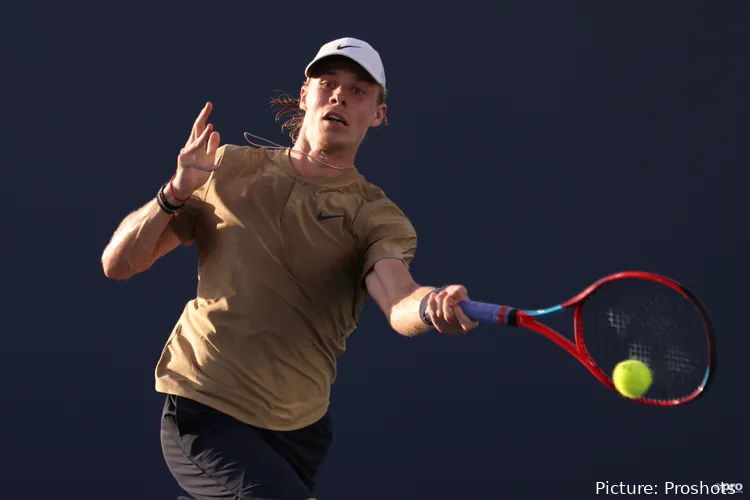
Canada’s Denis Shapovalov found himself in an unusual moment of tension at the Swiss Indoors in Basel after accidentally hitting the chair umpire during a quarterfinal match against France’s Giovanni Mpetshi Perricard. The 25-year-old left-hander, who had been trying to return serve, misdirected a shot that struck the umpire. The incident, caught on video and circulated widely on X (formerly known as Twitter), shows Shapovalov immediately recognizing his error and rushing to the chair to apologize, a gesture that the umpire appeared to accept in good humor. Still, the unexpected turn of events added drama to an already intense match, which saw Shapovalov narrowly edged out by Mpetshi Perricard in a tight three-set battle, ultimately losing 6-7, 6-3, 7-6.
The mishap with the umpire underscored what has been a challenging match and season overall for Shapovalov. His performance against Mpetshi Perricard, who is known for his powerful serve, was less than ideal. Shapovalov managed just seven aces, far fewer than his opponent’s 27, which heavily influenced the flow of the match. Additionally, Shapovalov struggled to convert any break points, which put him at a disadvantage in the crucial moments of play. Overall, he scored 101 points compared to Mpetshi Perricard’s 108, a narrow margin but one that ultimately determined the outcome of the match.
This loss in Basel marked Shapovalov’s second quarterfinal exit in 2024, his previous one being at the Citi Open in Washington, where he was disqualified following a contentious argument with a spectator. This latest quarterfinal loss reflects a broader pattern of inconsistency in Shapovalov’s season, where he’s struggled to find his rhythm and has been unable to deliver strong finishes in tournaments. Shapovalov has ended the season with a record of 19 wins and 24 losses, highlighting a year filled with ups and downs and missed opportunities to capitalize on his natural talent and on-court aggression.
In the Grand Slam events this year, Shapovalov has also had an uncharacteristically weak showing. Starting with the Australian Open, he faced an early exit in the first round, losing to the Czech Republic’s young player Mensik Jakub in straight sets (6-3, 7-5, 7-5). Shapovalov’s inconsistency and frustration were evident in the match, and the loss was an early signal that the year might not be smooth sailing for the talented Canadian. The result in Melbourne was a significant blow to Shapovalov’s confidence, as he had aimed to make a deep run, particularly after a solid performance in the latter half of 2023.
Moving forward to Roland Garros, Shapovalov managed to get to the third round but was once again thwarted by a higher-ranked opponent, this time Poland’s Hubert Hurkacz. Hurkacz defeated Shapovalov 6-3, 7-6, 4-6, 6-1 in a match that showcased the Canadian’s continued struggles with consistency and physical endurance over extended matches. Though Shapovalov demonstrated flashes of brilliance, his inability to sustain momentum became apparent as he ceded control to Hurkacz in the final set. The French Open exit mirrored his Australian Open loss in terms of missed opportunities and inconsistency.
At Wimbledon, Shapovalov managed to reach the third round again, where he encountered rising American star Ben Shelton. In a dramatic, five-set contest that exemplified the highs and lows of Shapovalov’s game, Shelton ultimately prevailed 6-7, 6-2, 6-4, 4-6, 6-2. Shapovalov’s skill in adapting his game to grass was evident, as was his powerful forehand, which troubled Shelton at times. However, the match underlined Shapovalov’s struggle to maintain focus in high-pressure situations. His physical and mental endurance faltered in the deciding set, allowing Shelton to capitalize and seal the victory.
Shapovalov’s final Grand Slam appearance in 2024 was at the US Open, where he faced another disappointing early-round loss. This time, he went down in straight sets (6-4, 7-5, 6-4) to the Netherlands’ Botic van de Zandschulp. The match displayed van de Zandschulp’s steady baseline game, which countered Shapovalov’s more aggressive but error-prone approach. The Canadian’s inability to adapt his tactics to the Dutchman’s style led to a quick exit in New York, capping off a disappointing Grand Slam season with no significant breakthroughs or notable wins.
Despite these struggles, Shapovalov has remained one of the most entertaining players on the ATP Tour, known for his flashy, left-handed style and powerful groundstrokes. However, this season’s performance has reignited concerns about his inconsistency and ability to manage emotions on the court. His talent is undeniable, but his mental game and decision-making in crucial moments have often hindered him from taking the next step in his career.
While 2024 hasn’t yielded the results he hoped for, Shapovalov has shown resilience in previous seasons, bouncing back from difficult periods to post impressive results. His performances in high-stakes matches, while inconsistent, have demonstrated his potential to compete with top-tier players when he’s at his best. As he reflects on this challenging season, Shapovalov may consider adjustments in his training, focus on physical conditioning, and work with a sports psychologist to improve his mental resilience. Such changes could help him unlock a more consistent game and become a genuine contender for titles in the coming years.
The incident with the umpire in Basel may have been accidental, but it also highlighted Shapovalov’s tendency to act impulsively in the heat of the moment, a trait that has sometimes cost him in important matches. As he moves into the off-season, Shapovalov will need to work on balancing his aggressive playing style with better composure on the court. If he can harness his natural talent and improve his mental toughness, there is no doubt that Shapovalov could return as a more formidable force in 2025, ready to compete at the highest levels and perhaps even challenge for a Grand Slam title.
Leave a Reply